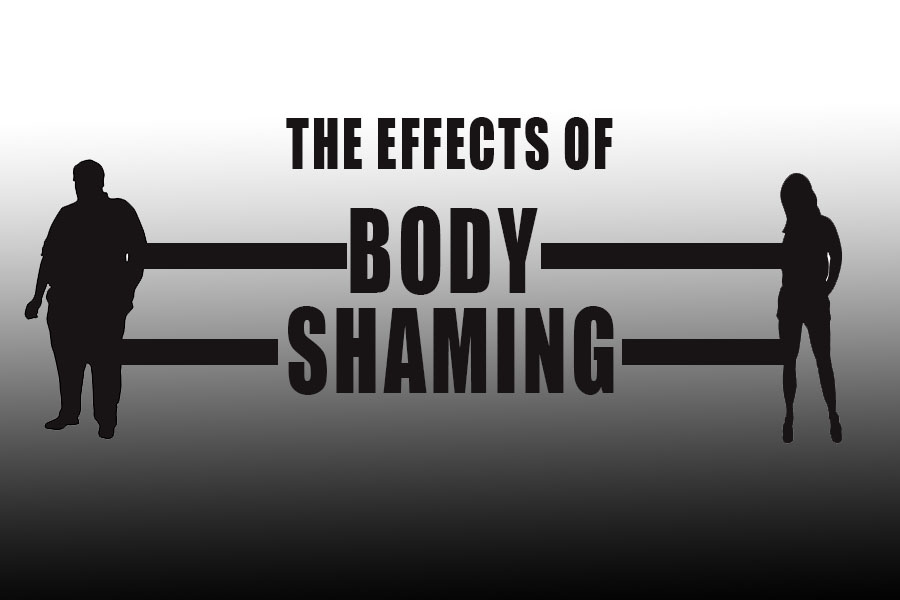Body Shaming
Throughout my life, I have always been a small person. If you look at pictures of me from any point in my life, you can see this. And so, throughout my life, I have also always had people comment on my weight. I always heard things from people, like girls in the halls saying “Oh my god, she is way too skinny,” to even my teachers telling me I “need to eat a huge slice of chocolate cake” or that they are “concerned I am not eating enough.”
For years these types of comments took a huge toll on me. When I was younger I would overeat in an effort to gain weight. At these points in time, I would have rather have had someone finally call me fat than keep calling me too skinny. When the overeating did not work, I would wonder what was wrong with me and why I was not “normal.” But, the thing is, I am normal, and I have realized through the years that I am just fine the way I am. This is just how I look, and it is not anyone’s place to comment on the fact that they do not think that I am normal.
So, this brings into question why it seems okay for everyone, including teachers, to comment on my weight and essentially “skinny-shame” other people, but it is never okay to call someone “overweight,” or “fat.” Through my personal journey, you can see that skinny-shaming takes just as much of a toll on people as fat-shaming does. In learning from my own experiences, I wanted to see how body-shaming has affected other people as well, whether it be skinny-shaming or fat-shaming, and compare the two.
So I took this question to the student body. My poll ended up receiving 106 responses. I started the poll off by asking whether or not the students thought that skinny-shaming was okay. 88.7% of the students said that it was not, while 11.3% claimed it was. Then I asked the same for fat-shaming, which elicited the same response. After that, I posed the question of whether or not they were essentially the same idea. 82.1% of the respondents agreed that it was, and 17.9% said they were not the same.
Then, I asked why the students thought that they were or were not the same. This question prompted a lot of opinions. Many of them fell into three categories: Students saying that they were not the same and fat-shaming was worse; students saying they are simply different, but neither is worse or better, and students saying that they are the same/have the same effects. People wrote responses saying “Fat shaming is worse,” “Because you feel differently being shamed with either one,” and “They’re both shaming someone for how they look.”
I think these responses showed a good range of opinions, and how much people know about body-shaming. Some of the responses showed that people may not really know very much about this topic, like someone noting that “if you’re skinny just eat.” This is not a very good argument. Many people, like me, cannot simply just gain weight from eating. Their bodies do not function in the way that many average people’s bodies do. Some people have a very high metabolism that makes it very hard to gain weight. On the other side, someone claimed “obesity and being overweight is controllable” and another claimed that “while being skinny isn’t inherently unhealthy, being fat is always unhealthy.” This again is just wrong. Everyone has a different “healthy” weight, and for some people that weight is more than average, or appears to be. There are also many medical conditions that can halter people from losing weight or just make their bodies naturally heavier. This often is not something people can control, even if they work out and eat healthily. Whether someone is perceived to be skinny or overweight, people need to remember that there is not just one version of a healthy body. If someone seems like they actually have an issue though, someone close to them should have a conversation about it with them, in a non-shaming way.
After this, the students were asked whether people thought that either idea had negative effects on the victims. 89.6% said that skinny-shaming can have negative effects on the victims, and 92.5% also claimed that fat-shaming could have negative effects. These numbers are obviously very close, but it is interesting to see a slight difference. The next question asked how many people had been fat-shamed or skinny-shamed. 48 of the respondents said that they had been fat-shamed, and 34 said they had been skinny-shamed. So, I then asked those who said they had been shamed if they would be willing to be interviewed in an effort to learn more about other people’s experiences.
Through these interviews, I saw a lot of different perspectives. Many people had similar experiences but had very different responses. One senior male said that while being fat-shamed affected him in physical ways, it did not take a negative toll on him or affect his confidence. He even said that “it actually affected me in a positive way, because in that way it kind of made me strive to better myself physically.” When I asked him what he would say to someone who is currently being shamed for their weight, he said, “don’t let it get to you, and if you’re gonna let it get to you, they’re just winning. So, use those words as encouragement to inspire yourself to get better physically.”
A senior female had a very different experience. She claimed that being fat-shamed had “always affected me depending on how I look. I always tend to go in the mirror and ask, ‘does this shirt make me look fat, does this make me look too big.’” Her experience was much more negative, taking a toll on her self-confidence. She also mentioned that when she was younger she used to enjoy swimsuits, but after being told that “swimsuits aren’t for people like you,” she has never worn a swimsuit again because it makes her very self-conscious. When I asked her what she would say to someone who body-shames others she said, “Don’t do it. You never know what people are going through. Being shamed can lead people to just hate their body and stop eating, or eat until they get sick.”
A female junior also commented on her experience with being fat-shamed. She said that “Being fat-shamed made me hate my body more than I already had before. I was young, and going through so many changes and hating on my developing body and when you already personally feel that way about yourself, hearing it from someone else makes you feel like it must be true, and that it’s not just a thought.” These comments took a very negative toll on her physically as well. She said she felt like she couldn’t wear basically anything without feeling self-conscious. It has left lasting effects on her that will not soon leave. As she says, “It’s a constant struggle, even after losing weight to feel better about myself. Most days, even if I’m wearing something I feel confident in and people tell me how cute I look or how they like my outfit, I can still get those thoughts of “I’m fat and ugly.”
A female sophomore was on the other side of the spectrum, with her experience being with skinny shaming. She said that mostly comments about her weight just make her feel uncomfortable, but that they have also made her confidence go down quite a bit. She even said, “I wear clothes that are purposely too big so that people don’t make comments.” This is something I have heard a lot from people who are skinny or fat-shamed. If someone can’t see it, they cannot comment on it. But, while this may be protection against comments, it can often take a toll on the person’s self-confidence. She also said that she mostly does not understand why people feel the need to comment. “I just don’t see the point in saying anything at all. If someone was overweight, they wouldn’t say anything. Why is it different when someone is skinny?”
Another female sophomore shared a similar experience with being skinny-shamed but had a different response. She said, “When I was younger it honestly made me feel better about myself because I didn’t really have any problems with my body being that skinny.” However, the aftermath of these comments from when she was young is a lot different. “People used to tell me I was skinny all the time, and I know I was super skinny when I was younger. But, I’ve obviously gained a lot more weight since then. So, sometimes it brings me down and I wish I was still skinny.” This is an interesting perspective that I have not heard a lot, but with modern beauty standards for women, it makes sense.
A female junior also shared her experience with being skinny-shamed, which was similar to the first sophomore’s. She said that “ At this point, I try to let it go but being told to eat more and that I’m just skin and bones makes me angry.” She also shared a common idea that many people who are skinny-shamed feel. “I have been trying to gain weight so the comments stop. When I look in the mirror I typically wonder if my body would be nicer if I had more weight.” Like the first sophomore, she also said that she feels uncomfortable wearing certain clothes and tries to not wear short-sleeves because of the comments she will receive about her arms.
The overall consensus for most people on this topic is that no matter the situation, it is not your place to comment on someone’s weight. Of course, if you personally know them and think that they may have a disorder, it is important to talk to them, but do it in the right way without shaming them. Mostly, more people need to realize that there is not just one version of a healthy body and that you need to know the whole picture before you comment on someone’s body.

Hello readers, my name is Margaret Hoff and this is my third and final year writing for the Spud. This year, as a Senior, I have been promoted to Co-Editor-in-Cheif....











